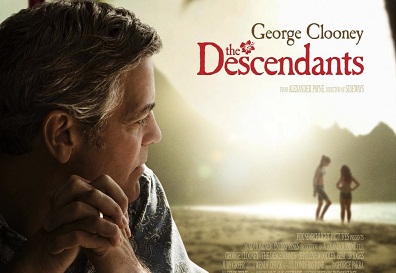How Will You Be Remembered: Lessons From “The Descendants”

Spoiler Alert! I think much of the storylines I discuss below can be gleaned from several of the movie’s previews which you can see here and here. However, if you have never seen the movie and would like to see it without knowing anything about it, please don’t read any further.
How will I be remembered when I die? That was the thought that crossed my mind as my husband and I watched “The Descendants” over the weekend.
The movie is about a character named Matt King, played by George Clooney, whose wife, Elizabeth, is seriously injured in a boating accident and winds up in a coma. The couple has two girls, ages 10 and 17, neither of whom have a close relationship with their mother or father, a self-described “back-up parent.”
Elizabeth had taken all the proper legal steps to ensure her affairs were in order. She had signed an advanced directive making it clear that she did not want to be kept alive by artificial means if there was no chance of recovery. By doing so, she relieved her family of the burden of having to make that choice. But despite having her legal affairs in order, she left two daughters who didn’t have a good relationship with her.
In the beginning of the movie, we learn that the younger girl, Scottie, has taken hundreds of photographs of her dying mother and shared them at school, which didn’t go over well with her teachers or the other students. She unemotionally tells her father that a famous photographer had done the same in the name of art, seeming baffled at what all the fuss is about.
The older daughter, Alex, is in boarding school. We learn that Alex has had substance abuse problems, but she’s been doing better. Her grades are up and she took part in the school play, something her parents didn’t notice because they were too busy with their own lives to care what was going on in hers. Alex’s relationship with her mother is especially contentious because she caught her mother having an affair on her last visit home from school.
In an especially poignant scene, Alex stands in her mother’s hospital room to say goodbye, but all that comes out of her mouth is contempt. She says she’s sorry she wasn’t good enough and that she went to a private school which cost $35,000 a year thereby depriving her mother of the luxuries she wanted. In Alex’s opinion, those luxuries mattered more to Elizabeth than her children.
Alex’s relationship with Elizabeth stands in stark contrast to a story I heard a couple of weeks ago. A pastor preparing for a funeral service had asked a grieving daughter to tell him about her mother. The daughter replied that the most people wouldn’t be very impressed by the things she was about to share but they were most important to her.
“You know what I loved about my mom? She was there for me at every basketball game I ever played, home or away. And I could call her on the phone, and if I was sad, she was sad. And if I was happy, she was happy. If I was concerned, she was concerned for me. That’s who my mom was. She was my best friend.”
Our legacy is so much more than the stuff we leave and the legal documents we sign. If tragedy were to strike, I want my children to remember me as the mom who was there at every event to cheer them on, who rejoiced when they were happy, lifted them up when they were sad, and eased their burdens when they were concerned. I want my children to never doubt my love for them and to know that I felt blessed and privileged to be their mother.
We will all die someday, but the relationships we build with our loved ones will live on in their hearts and minds. How do you want to be remembered? Are you living your life in a way that fosters that legacy?

Comments